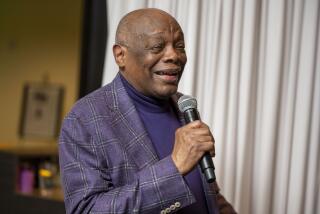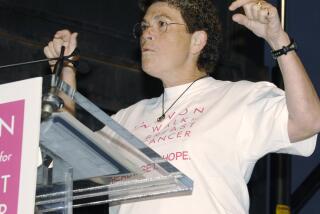SENIORS : A Pioneer in Cancer Education
- Share via
Helene G. Brown would probably be a prominent biologist today had she not decided that educating people about cancer would be a more effective use of her skills.
She has been known to fly her Cessna to college campuses to hold anti-smoking seminars. So ardent is her belief that certain cancers can be prevented through education that she took a salary cut at the Jonsson Comprehensive Cancer Center at UCLA so she could also lobby on health issues. She calls herself a political oncologist and cancer educator. And along the way, she has raised about $17 million for the cause--all from small donations.
It all started one day in 1950 when she went to see her doctor for a postnatal examination and he gave her a Pap smear. Brown was an educated 21-year-old--she already had earned a degree in business administration at UCLA--but she had never heard of a Pap smear.
“I asked my doctor, ‘What is this?’ After he told me about the test’s ability to detect, early on, cervical cancer, I did some research and found out the test was perfected in 1938,” she recalled in an interview at her office in Westwood.
In those days, an office visit and Pap smear cost just $5.50. Brown was appalled that so few women were aware of it.
“In the ‘50s women were not breadwinners, and doctors felt they didn’t have to care for them as well,” she said. “If doctors didn’t tell women to get a Pap smear, then they would have to ask for it themselves, and the only way that was going to happen was if they were educated to do so.”
And so began Brown’s 43-year relationship with the American Cancer Society. Her first project, she said, was “a terrible but effective film” aimed at women that greatly increased awareness of the Pap test. After that, she moved on to two other cancers that education can do much to prevent: lung and breast cancer. She served as president and chairwoman of the board of the American Cancer Society in Los Angeles. Now she is active in a grass-roots movement called the Health Reform Task Force, whose mission is to educate the public about President Clinton’s national health-care reform plan.
For Brown, education and prevention are the keys to good health. “I see a whole different paradigm for health care,” she said. “Once we get into the preventive mode, which I think is the direction the President is going, combined with the gene research going on, we’re going to see the ability to predict and manage disease rather than diagnose and treat, and I want to be part of the educational process.”
Among Brown’s current duties is advising the National Cancer Institute as a member of its Board of Scientific Counselors. Recently, she was part of a committee that provided the Clinton Administration with an update on the return on the $2-billion investment in cancer research over the last 10 years.
“My personal stake is working with the Administration on the grass-roots level, speaking at local meetings and dismissing the myths that have cropped up about health-care reform--like choice of doctors,” she said.
Since older people have more time and experience in galvanizing neighbors for important causes, Brown thinks that they are the perfect messengers for the President’s health care package.
“Seniors are change agents, and they need to be informed and inform others as well as question,” she said. “There is so much confusion about health-care reform that those with the most experience and greatest needs can influence others.”
Information on the Health Reform Task Force: (800) 923-1993.
More to Read
Sign up for Essential California
The most important California stories and recommendations in your inbox every morning.
You may occasionally receive promotional content from the Los Angeles Times.










